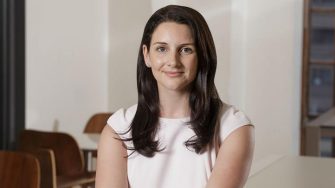
Working in a fast-paced environment as a management consultant, Brooke Shaw wanted to develop her knowledge and gain expertise that would advance her career. Undertaking a Master of Commerce, specialising in organisation and management studies, was a natural next step.
Brooke Shaw was five years into her role as a Management Consultant at EY when she realised she was ready for a challenge. Her decision to invest in a Master of Commerce, started paying dividends almost immediately, with Brooke promoted to the role of Senior Manager the year she completed her degree.
“After a year in the role I decided to take a career leap,” she says. “I wanted to have accountability for talent management.”
Two years on, Brooke is now Senior Manager of People and Communities at Dexus.
But, perhaps best of all, I noticed that I was having different conversations with my clients at work based on what I was reading and learning, and that ultimately helped to improve my performance.
Brooke Shaw
Senior Manager People And Communities
Dexus
Why a Master of Commerce?
“I was getting lots of hands-on experience, but I was craving the theoretical knowledge that would help me better perform my role."
“I felt that undertaking a Master of Commerce was the best value-add for myself, as well as for my employer.”
Postgraduate study exposed Brooke to ideas she may not have otherwise encountered.
“The course taught me about business innovation and technology, as well as providing a different lens through which to view human resources challenges."
"But, perhaps best of all, I noticed that I was having different conversations with my clients at work based on what I was reading and learning, and that ultimately helped to improve my performance."
“Although a Masters isn’t a prerequisite for my current role, it adds another level of depth to my CV,” she says. “With a Master of Commerce, you are perceived by employers as having real expertise and value in business.”
Is a business background necessary for a Master of Commerce?
Brooke had an undergraduate degree in business, but almost half the students undertaking the program don’t have a business background.
“Students may have an undergraduate degree in science, engineering or arts, but they want to broaden their knowledge and make themselves more ready for a business career,” says Tracy Wilcox, Academic Director of Postgraduate Programs and Program Director of the Master of Commerce at UNSW Business School.
“And for students who already have a business degree, a Master of Commerce can help them consolidate their learning and move to a new field.”
Hard and soft skills
For Brooke, the emphasis on practical and soft skills, as well as theoretical knowledge, was of enormous benefit.
“I learnt to be an inclusive leader and exercise my influencing skills, as well as practise oral and written communication, where I had to capture information, analyse it and present a business case,” she says.
These are skills that are immensely appealing to employers.
“Our research has shown that employers really value disciplinary knowledge, but they also place a lot of worth in skills such as teamwork, problem solving and ethical professional practice,” explains Tracy.
Diverse thought
The diversity in the student cohort undertaking the Master of Commerce was also incredibly valuable to Brooke.
“I was in tutorials with students from India, Asia and Europe,” she says. “I heard about the challenges faced in companies across the globe that I never would have heard of otherwise. This also gave me a deeper understanding of cross-cultural communication.”
A depth of choice
With 14 different specialisations to choose from, the Master of Commerce is a flexible degree to help professionals take the next step in their career. This could be by adding a business edge to an existing qualification or gaining the confidence to effectively execute organisational goals.
For Brooke, completing a Master of Commerce was an opportunity to further her development and open career doors, now and in the future.
“I am confident the ways of thinking it has taught me and the qualification itself has set me apart from other candidates for job roles, and will continue to do so as my career progresses.”
Choose the Master of Commerce specialisation that’s going to transform your career
